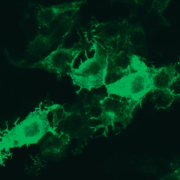Serological diagnosis of Chikungunya virus infections
Antibodies against chikungunya virus (CHIKV) can be detected with high sensitivity and specificity using new ELISA and indirect immunofluorescence test (IIFT) systems from EUROIMMUN. Serological analysis is an important supplement to direct pathogen testing in the diagnosis of CHIKV infections, especially given the short viremic phase. Antibodies against CHIKV are detectable from 6 to 8 days after onset of clinical symptoms, when direct detection is generally no longer effective. The determination of CHIKV antigens or anti-CHIKV IgM antibodies is, moreover, of major importance in the screening of blood reserves. The Anti-Chikungunya Virus ELISA (IgM) is a fully automatable test for the detection of acute infections. The assay is based on recombinant structural proteins from CHIKV and shows 100% sensitivity, as demonstrated with clinically characterized samples. The Anti-Chikungunya Virus ELISA (IgG) is based on the same antigen and is used to demonstrate seroconversion following infection with the virus. A four-fold IgG titre increase between acute and convalescence samples taken at least 14 days apart indicates an acute infection. The Anti-Chikungunya Virus IIFT (IgM or IgG) utilizes virus-infected cells for detection of specific antibodies. In the Arboviral Fever Mosiac 1 IIFT, the CHIKV substrate is combined with other arbovirus substrates for the differential diagnosis of CHIKV infections from e.g. dengue virus or Japanese encephalitis virus infections, which often show similar clinical symptoms.



